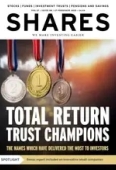Archived article
Please note that tax, investment, pension and ISA rules can change and the information and any views contained in this article may now be inaccurate.
Why management change matters and the importance of compounding

Always quoteworthy, Warren Buffett once said: ‘I try to invest in businesses that are so wonderful that an idiot can run them. Because sooner or later, one will.’
While the maxim has merit, management does make a difference and management changes can have a major impact – for good or bad – on even the best businesses.
The surprise departure of Unilever (ULVR) chief executive Hein Schumacher on 25 February after a little more than 18 months in charge certainly shook market confidence in the consumer goods giant.
Which is not to say his successor, Fernando Fernandez, who is stepping up from his role as finance director, won’t do a good job, but it injects a dose of uncertainty into the company’s future strategy, particularly given Schumacher’s departure was completely out of the blue and with immediate effect.
Wholesale changes seem unlikely: the spin-off of the ice cream unit is well advanced, but Fernandez may have his own views on how to proceed, and as an internal candidate he probably has less leeway to follow the regular playbook of taking a kitchen sink to the numbers and attempting to reset expectations.
The recent departure of chief executive Gavin Isaacs after just five months in charge prompted an even more dramatic fall in the share price of Ladbrokes-owner Entain (ENT).
The subsequent departure of other key executives, as clouds loom over the company thanks to legal action against it by Australia’s financial intelligence agency, has only added to the sense of unease.
A change at the top is often the first step in a company’s recovery, but an incumbent boss can also respond to external pressure, which may come in the form of a downturn in trading caused by the waxing and waning of the economy, some significant external event or the arrival on the share register of an activist investor.
The role of activists is often to shake management teams out of their complacency. For example, Deepak Nath, the boss of medical devices group Smith & Nephew (SN.), was up against it heading into 2025.
Swedish activist Cevian Capital was in the wings calling for change to address several years of share price and financial underperformance, but a strong set of 2024 results (25 February) accompanied by a robust outlook for the current year could convince investors to stick with Nath’s recovery plan for now.
Two articles in this week’s magazine explore the power of compounding – one in a very specific example at Assura (AGR) and the other looking at the wider benefits within an ISA.
In our view, investors cannot be reminded enough of the benefits of something Albert Einstein once described as the ‘eighth wonder of the world’ such is the impact it can have on your overall returns.
Important information:
These articles are provided by Shares magazine which is published by AJ Bell Media, a part of AJ Bell. Shares is not written by AJ Bell.
Shares is provided for your general information and use and is not a personal recommendation to invest. It is not intended to be relied upon by you in making or not making any investment decisions. The investments referred to in these articles will not be suitable for all investors. If in doubt please seek appropriate independent financial advice.
Investors acting on the information in these articles do so at their own risk and AJ Bell Media and its staff do not accept liability for losses suffered by investors as a result of their investment decisions.
Issue contents
Feature
Great Ideas
News
- Rentokil has a long way to go to catch up with US peer Rollins
- Centrica shares hit fresh 12-month high despite normalised trading
- German election result promises continuity as the centre holds
- Why Brown-Forman investors are in need of a stiff drink
- No easy way back for embattled B&M
- Buffett keeps his powder dry as Berkshire Hathaway’s cash pile tops record $134 billion
- Glencore slips to multi-year lows on weak coal price as it mulls London exit
 magazine
magazine








